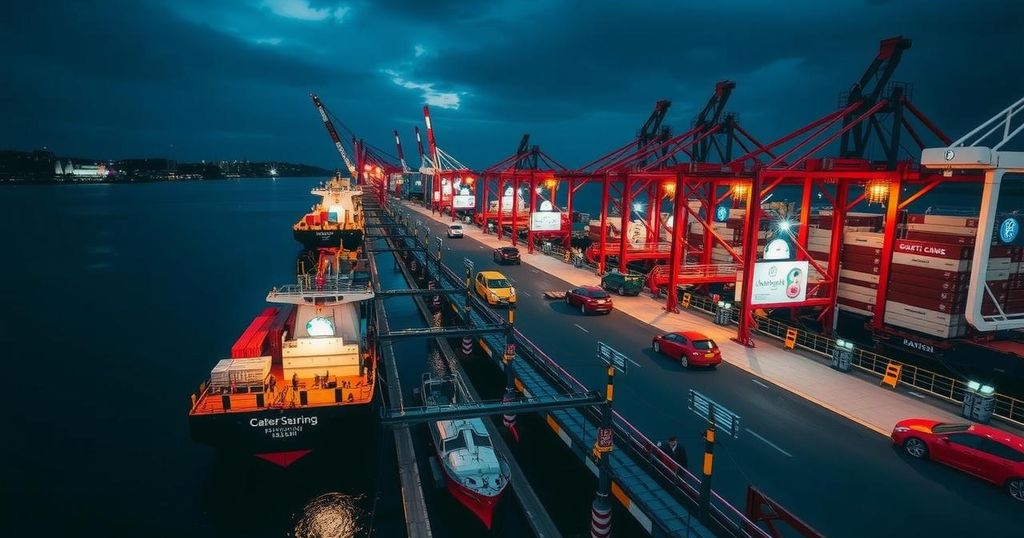Recent Brussels conversations explored critical issues surrounding port decarbonization, the economics of climate refugees, and logistics strategies in the context of climate change. Key discussions highlighted the impending decline in fossil fuel volumes through ports and the necessity for adaptations to low-carbon alternatives. The economic implications of climate-induced migration were emphasized, alongside strategies for electrifying freight transportation as a method for enhancing competitive advantage in decarbonization efforts.
The conversations in Brussels revolved around port decarbonization, the economic implications of climate refugees, and strategic logistics solutions in the face of climate challenges. The backdrop of the discussions was the launch of the second edition of “Supergrid Super Solution: A Handbook for Energy Independence and a Europe Free from Fossil Fuels.” Among the key contributors were professionals from the transportation and energy sectors discussing the existential threat faced by ports due to the declining volumes of fossil fuels moving through them. The dialogue highlighted that currently, approximately 40% of goods transported across borders are fossil fuels, much of it via maritime shipping. Prospective shifts indicate this percentage will drastically decline, necessitating ports to pivot unavoidably towards burgeoning container markets, which may not compensate for the lost bulk tonnage and could lead to reduced revenues and potential bankruptcy in port operations. Moreover, there is a pressing need for ports to adapt rapidly to bunker diverse low-carbon fuels such as biofuels, while grappling with complexities associated with multi-fuel bunkering systems that might offer limited port space and increased costs. Some energy solutions like ammonia, hydrogen, and nuclear power were evaluated and deemed impractical at this juncture due to various safety concerns and market hesitance. The discussions also extended into climate economics, particularly concerning the impact of climate change on migration patterns. Notably, the Syrian refugee crisis was identified as a case study where climate change exacerbated existing vulnerabilities, directly influencing mass displacement. This conversation underscored the economic ramifications of climate-induced migration and the absence of economic models to foresee and mitigate these impacts specifically. In addition, there was a strong emphasis on electrifying the transportation sector, particularly for logistics and freight companies, as the shift toward electric vehicles could yield significant cost advantages and foster competitive differentiation in supply chains. The need for strategic investment and readiness to address emerging logistics challenges due to the electrification of freight operations was underlined in the exchanges. Ultimately, a rich tapestry of insights and strategies emerged from the conversations, reflecting a collective commitment to addressing the multifaceted challenges posed by climate change across various sectors. The collaborative spirit and dedication to environmental innovation among participants were enriching and inspiring for future endeavors.
The backdrop of these Brussels conversations was the significant issue of climate change and its systemic effects on various sectors, particularly transportation and logistics. As the urgency for decarbonization intensifies, ports, key players in global trade, face impending shifts in the nature of goods they handle due to decreasing demand for fossil fuels. This necessitates a strategic reassessment of operational models, especially regarding the diversification towards low-carbon alternatives. Additionally, the economic repercussions of climate-induced migration and the lack of frameworks to address the societal challenges that arise from such displacement are becoming increasingly evident. Consequently, the discussions shed light on the intersections between environmental sustainability, economic policy, and logistics strategy.
In conclusion, the conversations held in Brussels served to illuminate the critical state of port operations facing decarbonization demands, the intricate dynamics of climate change-induced migration, and the overarching need for electrification in the logistics sector. Participants expressed a willingness to engage collaboratively to tackle these challenges, revealing a growing recognition of the necessity for innovative solutions in the face of climate uncertainty. Ultimately, these discussions fostered a deeper understanding of the paths toward sustainable practices across interconnected industries, emphasizing that a collective approach to problem-solving will be essential in moving forward.
Original Source: cleantechnica.com






